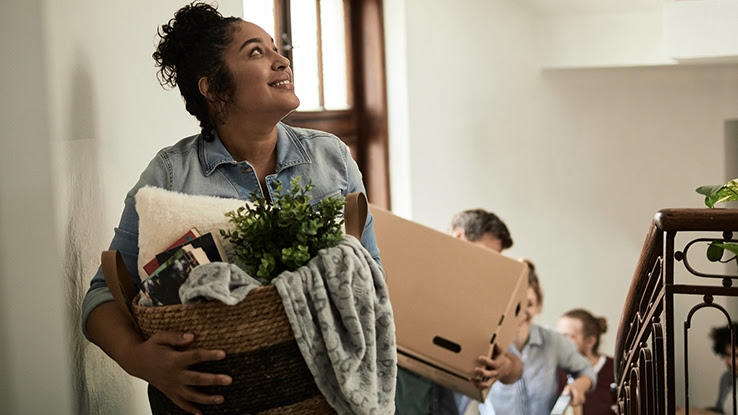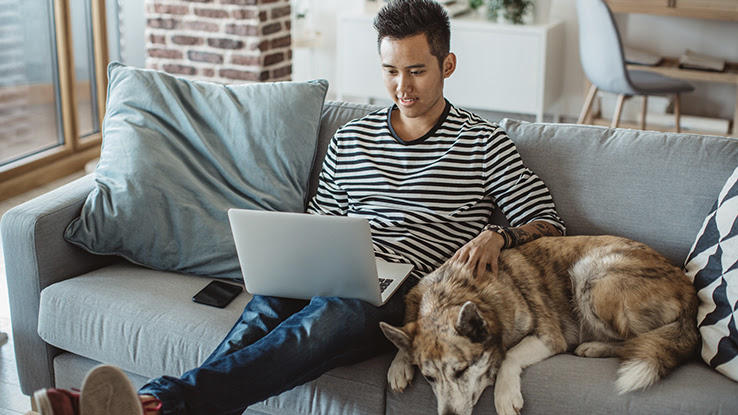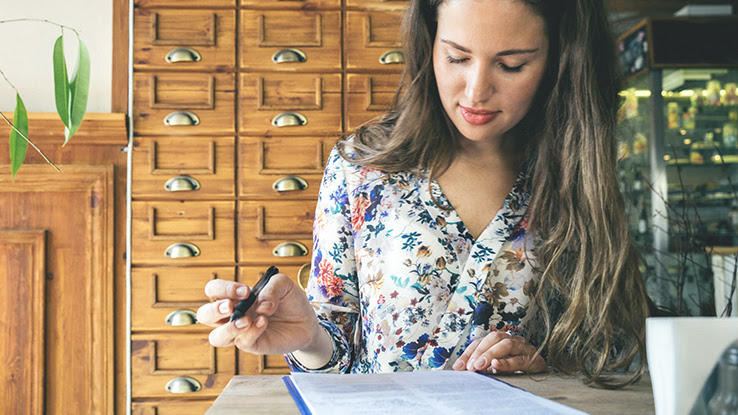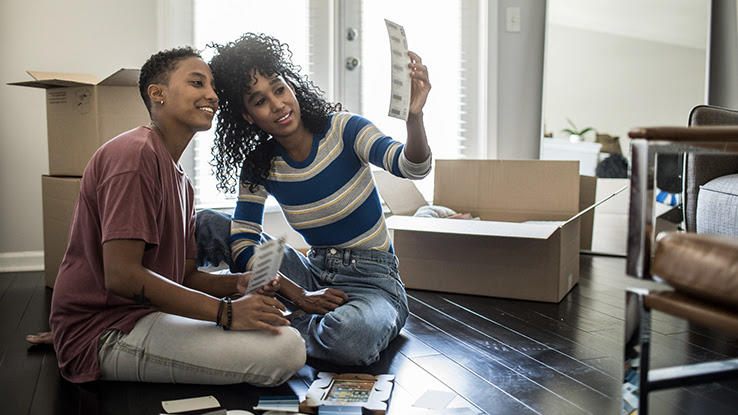The Most Likely Source of Continuing Money for a Elderly Occupant to Afford a Nursing Home is Which

Are you getting ready to rent your first apartment? It's definitely an exciting prospect — you'll have your own space that you'll get to decorate and, most importantly, call your own. But how do you get from scrolling through apartment listings online to filling out your lease application and purchasing renters insurance? Thinking about the logistics of it all is exhilarating, if not a little daunting.
Becoming a renter for the first time is an important rite of passage, and it's one that comes with quite a few steps, responsibilities and checklists. But it's also a time of freedom when you'll get to decide what kind of place you really want to live in. To help you get ready for the process, we've prepped this guide that'll show you how to navigate everything from budgeting for rent payments to finding a great apartment to paying your security deposit.

Your budget will play a big role in which apartment you choose. In real estate, it's a good rule of thumb to follow the 30% rule. This means that your total housing expenses shouldn't exceed 30% of your income. Your rent, pet fees, parking costs and renters insurance will all fall under your housing budget. This guideline is designed to make sure you have enough money left to cover the rest of your expenses.
When you're determining your budget, it's helpful to write out all your income and expenses. Seeing them listed out gives you a clearer idea of the areas where you can make some cuts if needed. Give yourself plenty of room for essentials like groceries and fixed bills like your car loan payment. Determine what 30% of your income is, and figure out what you can do — where you might need to make cuts — to ensure at least that amount is freed up to cover your housing costs.
If your budget is tight, having a must-have list can be really helpful. You might not be able to afford everything on your wishlist, but knowing your needs may play a bigger role in narrowing down your options than you initially anticipate. And, it'll help make sure your priorities are covered. If you have a dog, for example, opting for an apartment that allows pets is more important than having a second bathroom, even if the costs average out to around the same amount. Be clear on your priorities and the areas where you have more room to make sacrifices.
Having roommates can be a great way to cut down on expenses. Not only are you able to split the rent, but you're also able to split utilities and other bills. There are, however, pros and cons to having roommates. If you cherish your alone time, maybe you're willing to have a smaller space where you can live alone. If you crave companionship, a roommate might be a welcome addition.
How to Start Looking for Your First Apartment

These days, most people take care of almost all their apartment hunting online; it's a lot more convenient than driving around the city hoping you'll come across "for rent" signs in windows. But before you even start looking online, you'll want to narrow down your location. If living close to school, work or certain public transportation lines is important to you, you'll want to define these parameters first and foremost so you can filter your online search results accordingly. The size of the building and the apartment itself may also determine the area you live in. While you can rent a house in a less expensive area, in a dense city environment, you may find more high-rise apartments available.
Online, you can often select the number of bedrooms and bathrooms and your desired amenities easily. If you have a pet, you'll be able to see which apartments are pet-friendly and if there's a pet deposit. You may also find apartment signs just by walking through the neighborhood — which is actually great for helping you get a feel for the overall ambience. After you've chosen your desired location, take a walk around and note any rental signs. Grab the numbers so you can make some calls later and see if the apartments are a good fit.
Once you have your parameters and filters in place, narrow the results based on your budget — again keeping in mind those features and amenities you might be willing to sacrifice to ensure you can afford the apartment. When you've found a few options that look promising, make some calls to the leasing offices or landlords and schedule walk-throughs.
Filling Out Your Lease Application

Getting ready to sign a lease might seem daunting, but there are a few hacks to make this process a little easier. To start, have all your basic information handy. Almost every apartment application asks for information from your driver's license or identification card and your Social Security number. You'll also need to verify your employment and your income. If you're in college and co-signing with a parent, they'll need to provide this personal information as well. You'll also need to pay an application fee when you apply. Sometimes this is waived or credited back when you rent the apartment.
With each application, the management company or landlord will run a credit check to determine how risky it may be to rent to you. If you don't have established credit yet, having a co-signer might be necessary for you to qualify. Before you apply for an apartment, consider opening a low-limit credit card to start building your credit history. When you use it and pay it off each month, you'll start to build a healthy credit history that signals to a landlord or property management company you're a good candidate.
Signing Your Lease

Perhaps the most exciting step in renting an apartment is signing the lease. After your application has been approved, you'll make it official by signing the contract that outlines everything from the amount of rent you'll pay to the length of time you'll rent the apartment.
Before you sign on the dotted line, though, make sure to take your time and read through the lease. Anything that makes you uncomfortable is worth asking about, and you'll want to be clear on all the details before you sign this legally binding paperwork. Make sure you know where to send your rent payments and the date they're due each month, but also look into rules like guest policies and any maintenance you'll be responsible for. When you sign your lease, you'll also pay your security deposit, your first month's rent, and possibly a pet deposit or your last month's rent, depending on the provisions of your lease.
Paying Your Security Deposit

You're almost officially a renter! Paying your security deposit is the next thing to check off on your list of making it official. You can think of the security deposit as a sort of insurance you pay to the landlord or property manager in case you damage something in the apartment while you live there; they can use this money to cover those repair costs. The amount of security deposit may vary, but it's often the same cost as one month of rent, and the landlord can return it to you when you're moving out as long as you haven't caused any of the types of damage outlined in your lease.
Before you move in, record the condition of your unit. Take pictures of anything that's already damaged before you take possession, and let the landlord know to add this information to the lease. This way, if your landlord says you broke or damaged something, you have proof it was there before you moved in. Once you move out, your landlord will go through and check the condition of the unit. If anything is damaged more than normal wear and tear, they can take the cost for repairs out of your security deposit. If you have pets, some apartments may require a pet deposit as well.
Paying for Renters Insurance and Utilities

Before you move in, there are a few important things you'll need to set up. First, you'll want to get renters insurance to cover any emergencies that take place while you're living in your apartment. Many landlords will require you to purchase a renters insurance policy and provide proof of it before you move in.
You'll also want to call the utility companies to set these up in your name. Depending on where you live, things like cable and internet may be included in your rent. If they aren't, call these companies, along with the gas, water and electric companies, before you move so you don't have any interruptions in service.
Source: https://www.askmoney.com/insurance/guide-to-renting-your-first-apartment?utm_content=params%3Ao%3D1465803%26ad%3DdirN%26qo%3DserpIndex&ueid=6d69d5c8-57ce-4d3a-89a8-8769cfbff18b
0 Response to "The Most Likely Source of Continuing Money for a Elderly Occupant to Afford a Nursing Home is Which"
Post a Comment